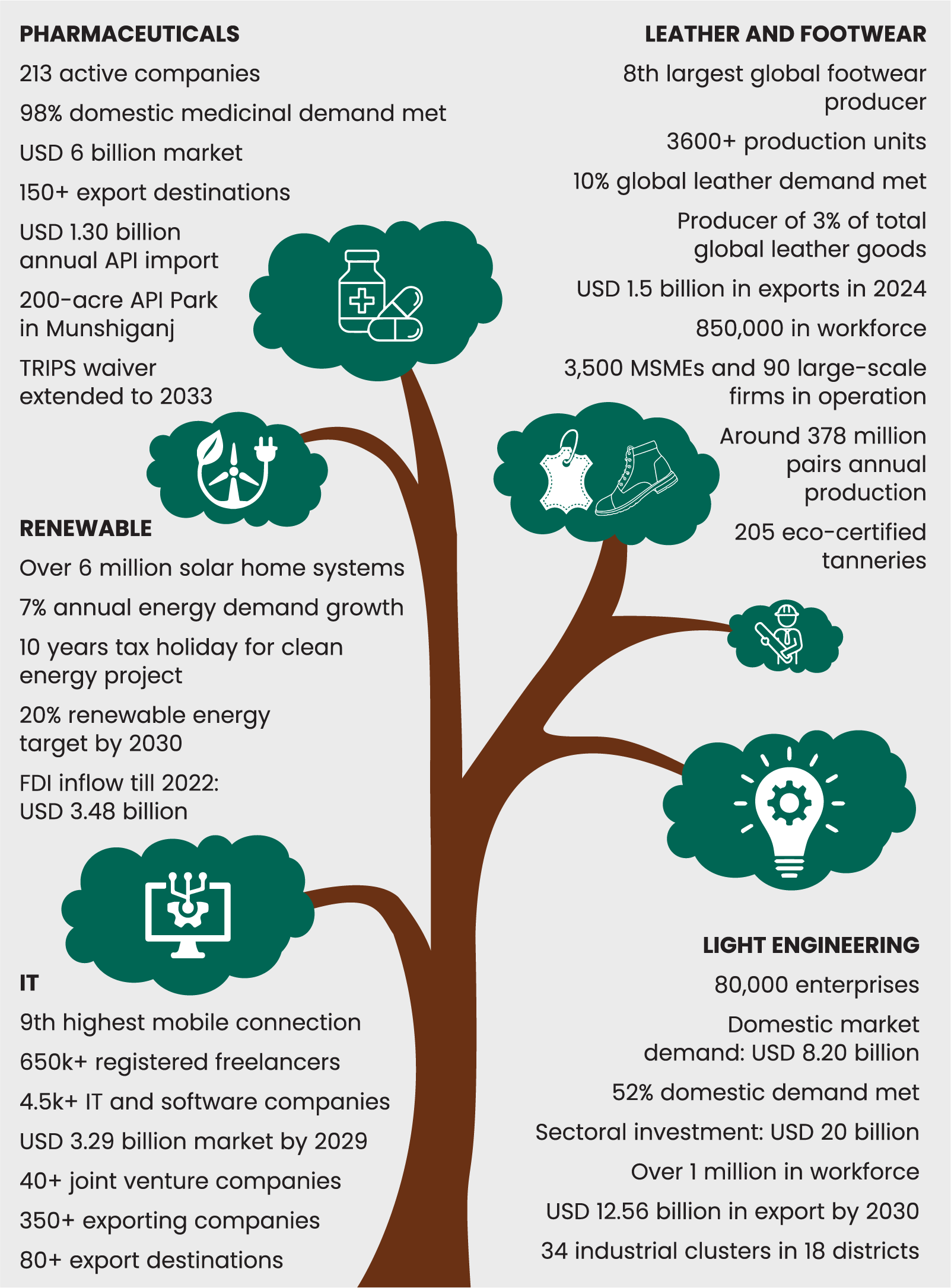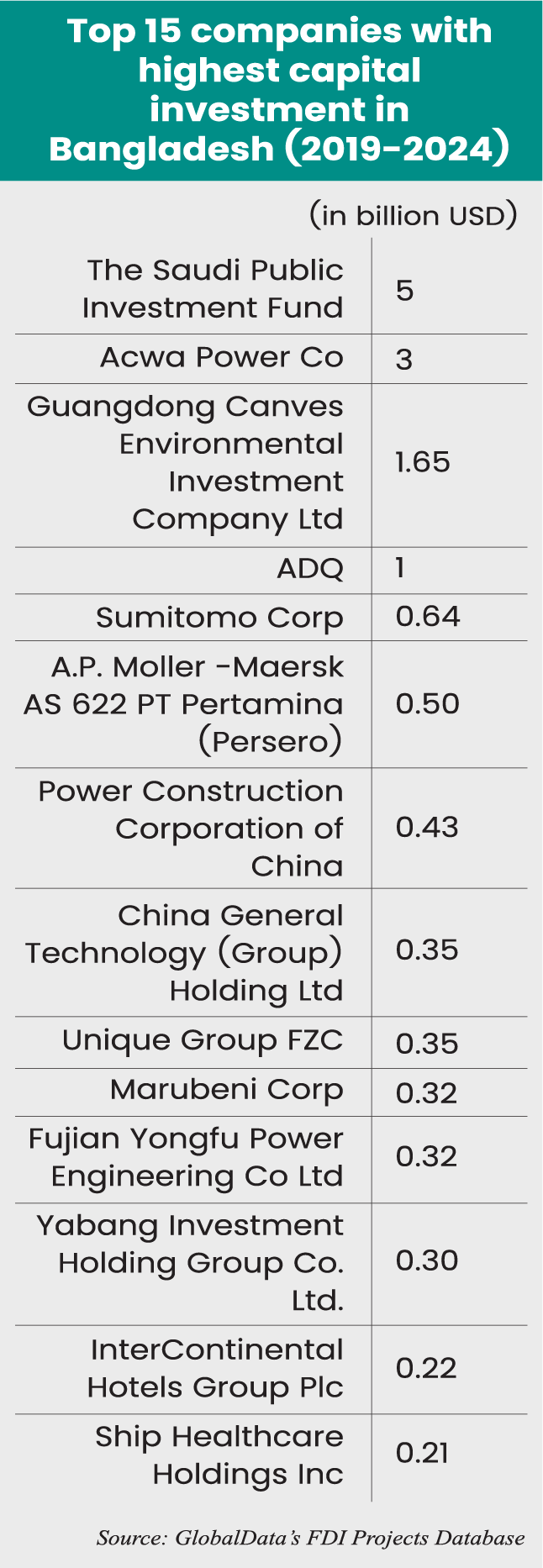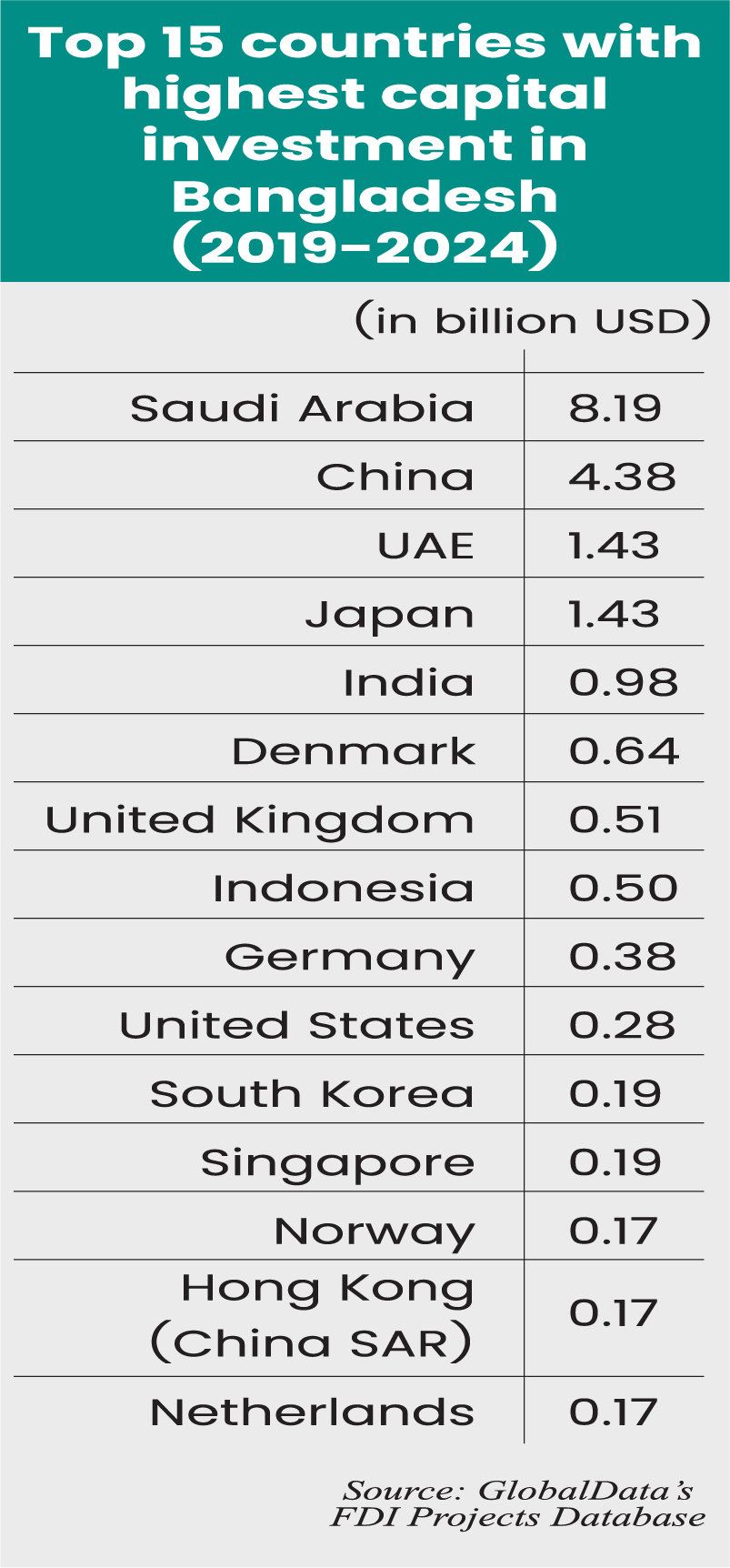Making an investment-friendly Bangladesh
August 09, 2025


Much has been discussed regarding the decline in foreign investment inflow over the past few years. Following the political regime change last year, the interim government has been working relentlessly to improve the country’s business climate and enhance investment opportunities.
However, things are still slow, and economists and experts alike believe that it will take some more time for foreign investment inflow to get to the growth trajectory.
Chowdhury Ashik Mahmud Bin Harun, the Executive Chairman of the Bangladesh Investment Development Authority (BIDA), recently shared his thoughts regarding the overall investment situation in an interview with Industry Insider.
Ashik Chowdhury is also the Executive Chairman of the Bangladesh Economic Zones Authority (BEZA). He holds the rank of State Minister and is the first private sector leader to head these key investment promotion agencies (IPAs) under the Chief Adviser’s Office.
The interview was conducted by Shafiqul Islam.
What short- and long-term measures has the current interim government taken to make Bangladesh a safe and attractive investment destination?
To transform Bangladesh into a secure, reliable, and appealing destination for investors, the current interim government has been implementing a range of short- and long-term initiatives. In the short term, the focus has been on simplifying and expediting services for investors.
For example, the approval period for investments has been reduced from 45 working days to 21, and most investor services have been brought online to minimize bureaucratic delays. A ‘plug-and-play’ model has been introduced in 12 economic zones, allowing investors to begin production without delay.
Additionally, in the Mirsarai Economic Zone, officially known as the National Special Economic Zone (NSEZ), income tax exemptions are being offered for up to five years, and utility connections for gas and electricity are ensured within 15 working days.
To simplify legal procedures, a special economic court has been established for resolving investment disputes, and the validity of industrial licenses has been extended from one year to three.
In the long term, the government is focused on making the country’s infrastructure, human capital, and policy environment more investment-friendly.
Construction of the Matarbari deep seaport is already 85% complete, and the design for the Dhaka-Chattogram high-speed rail project has been finalized.
There are also initiatives underway to develop high-tech parks, train the youth, and establish international-standard technical training centers to enhance the country’s human resource base.
A heat map for investment opportunities has been introduced, where ten priority sectors have been identified. Special incentives, including tax exemptions, have been rolled out for green energy and high-tech industries.
These multi-dimensional efforts are all aimed at turning Bangladesh into one of South Asia’s most competitive and trusted investment destinations.

Beyond promotion and branding, are there any practical reforms or initiatives that could lead to visible progress in the near future?
When it comes to improving the investment climate, the government is placing strong emphasis on realistic and results-driven reforms, along with promotion and branding. Several necessary steps have already been taken to simplify and expedite investment approvals and licensing procedures significantly.
We’ve implemented some high-impact initiatives that are already showing visible results.
For instance, the time required to obtain business startup approvals in various zones has been halved, which has boosted investor confidence and interest. On the legal front, the establishment of a Special Economic Court has made it possible to resolve investment-related disputes more efficiently.
In addition, the extension of industrial license validity from one year to three has reduced administrative hassle for entrepreneurs.
Among incentive-based reforms, the Mirsarai Economic Zone (NSEZ) now offers tax holidays, guaranteed timelines for utility connections, and 100% foreign ownership in green energy and high-tech industries – provisions that are already in effect.
The government is also reviewing outdated and unnecessary laws and regulations to foster a more business-friendly environment.

Bangalore, India, is now a globally renowned tech city. Can Bangladesh follow a similar model? Which aspects of India’s successful experience do you think are most relevant?
Bangalore didn’t become a global tech hub overnight. Its success is the result of years of investment in infrastructure, education, and the development and enforcement of enabling legislation.

We are learning from this experience. In Bangladesh, high-tech parks are already being established in major divisional cities, and IT professionals are actively working there.
At the same time, the government is expanding high-speed internet access and has launched several initiatives to enhance digital skills among the youth.
On another front, we are working to create a more supportive environment for startups by offering tax incentives and improving access to financing. For this kind of development, strong collaboration between the government, the private sector, and academia is essential.
Through initiatives such as Startup Bangladesh and various private training programs, we are implementing this strategy.
Let’s take another example. In the case of Silicon Valley, collaboration between universities and industry played a major role. Is Bangladesh pursuing any similar long-term plan?
Absolutely—we have long-term plans in place. We firmly believe that universities have a vital role to play in fostering innovation and entrepreneurship. Institutions like the University of Dhaka and BUET are already collaborating with the tech industry, and we aim to see similar initiatives expand across the country.

The government has a long-term vision to establish research centers and technology incubators on university campuses. These will provide students with access to funding, mentorship, and platforms to turn ideas into viable businesses.
There will also be legal support for innovators, along with assistance in patent registration. In the long run, our goal is to build a nationwide network where knowledge drives the creation of innovative enterprises, an ecosystem where creativity and entrepreneurship thrive hand in hand.
From the perspective of international investors, how are Bangladesh’s laws, policies, and dispute resolution mechanisms perceived? How is BIDA working to make them more acceptable?
Investors place the highest importance on transparent and impartial legal frameworks. That’s why BIDA is actively working to introduce alternative dispute resolution mechanisms such as mediation and arbitration.
We are also taking steps to establish commercial courts within special economic zones.
To enhance investor services, we regularly engage with international investors and development partners, carefully listen to their feedback, and take the necessary actions accordingly.
Very soon, anyone will be able to track the progress of our reform initiatives through the ‘Reform Tracker’ on the BIDA website. This will send a clear signal that we are committed to protecting investments and are working in line with international standards.


Which sectors is the government prioritizing for long-term foreign investment, and what role is BIDA playing in that process?
To attract long-term foreign direct investment (FDI), we’ve identified and promoted priority sectors through tools like investment heat maps to highlight sector-specific opportunities for both local and international investors.
Several key sectors have already been prioritized. For instance:
- Green Energy: This includes solar, wind, and waste-to-energy projects.
- ICT and Software: Development of technology parks, tax incentives, and training initiatives are being introduced to support growth in this area.
- Electronics and Light Engineering: Bangladesh has begun receiving investments from countries like China and Japan. With growing capacity, this sector has the potential to become a major export earner for the country.
- Pharmaceuticals and Medical Technology: The government is investing in research centers, offering export incentives, and funding clinical trials to boost this sector.
For each of these sectors, BIDA is working closely with relevant ministries, industry associations, and international investors to develop comprehensive roadmaps and ensure coordinated, strategic development.
With geopolitical shifts and supply chain disruptions, many countries are seeking alternatives to China. Can Bangladesh be such an alternative? If so, how?
I believe Bangladesh is already beginning to benefit from the ‘China Plus One’ strategy.
We have a large, young labor force, competitive labor costs, and duty-free access to many markets, including the European Union. We have taken initiatives to build a new deep-sea port, modernize existing ports, and improve connectivity, all aimed at strengthening our infrastructure.
Special economic zones offer ‘plug-and-play’ facilities that make it easier to start businesses quickly. If policy and infrastructure development continue steadily, Bangladesh has the potential to become a strong alternative for international investors.
From the perspective of foreign investors, political instability, labor unrest, and bureaucratic complexities are major challenges. How is Bangladesh addressing these issues?
We are effectively working on all three fronts. Regarding political stability, the government is committed to ensuring a peaceful and business-friendly environment.
BIDA operates with complete neutrality and professionalism in serving investors. We have also involved the country’s political parties in the reform process.
In May, we invited 17 political parties to present our investment reform agenda and progress. The aim is to ensure that any future government continues these initiatives consistently for the sake of national development.
On the labor front, we are collaborating with the International Labour Organization (ILO) and other international bodies to enforce labor laws and maintain standards in the workplace properly.
At the same time, to reduce bureaucratic hurdles, services are being digitized and automated.
Currently, through BIDA’s OSS (one-stop service) platform, we provide over 134 services from 44 agencies to investors, and more investment services will soon be integrated into the OSS platform. This will speed up service delivery and minimize bureaucratic complexity.
Most Read

Electronic Health Records: Journey towards health 2.0

Making an investment-friendly Bangladesh

Understanding the model for success for economic zones

Bangladesh facing a strategic test

Bangladesh’s case for metallurgical expansion

How a quiet sector moves nations

A raw material heaven missing the export train

Automation can transform Bangladesh’s health sector

A call for a new age of AI and computing
You May Also Like
